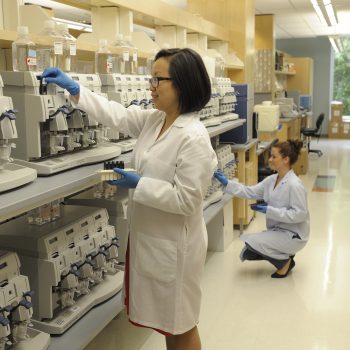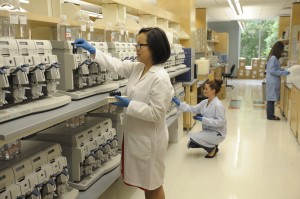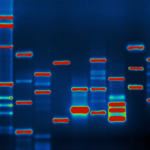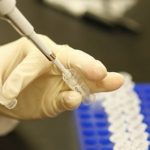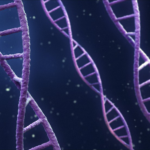Dr. Michael Christman is President and CEO of the Coriell Institute for Medical Research, an independent non-profit research center committed to the study of the human genome. In addition to housing the world’s most diverse cell line collection, Coriell is renowned for its innovative personalized medicine study. Initiated by Dr. Christman in 2007, the Coriell Personalized Medicine Collaborative (CPMC) research study is designed to examine how people process and use genetic test results, while also encouraging the adoption of genome information in the clinical setting.
Before coming to Coriell, Dr. Christman served as Professor and Founding Chair of the Department of Genetics and Genomics at Boston University School of Medicine. There, he directed several studies aimed at identifying genes that predispose individuals to complex health problems, such as heart disease and obesity.(a)
Footnote spoke with Dr. Christman about how genetic data will be used in healthcare and about his efforts to shape the evolving field of genomic medicine to meet the needs of patients and doctors.
Tell us about your interest in genomics and what motivated the creation of the Coriell Personalized Medicine Collaborative.
What interested me about coming to Coriell was moving to a smaller organization that could effectively address the issue of how you actually use personal genetic information in the clinical care of a patient. That was the genesis of the Coriell Personalized Medicine Collaborative – seeing at that time that sequencing was going to become cost-effective in the not-too-distant future, maybe 5 or 10 years, it made sense to measure human genetic variation and think about how to use it in everyday medicine.
There are a lot of questions associated with these developments. What are the ethical, legal, and social issues? How do you educate physicians? How do you make genetic counseling available? What information about the genome do you tell people, and what is not wise to tell them? How do you decide what is useful in a clinical setting and what might actually be concerning, or determine whether there is enough good evidence that anything can be done?
We wanted to ask all of those questions by taking a group of people – now it’s approximately 8,000 individuals that are in the Coriell Personalized Medicine Collaborative study – and returning a reasonable amount of genetic information back to them that we think is actionable.
How will access to genetic information transform healthcare?
One of the earliest examples of personalized medicine’s usefulness in the clinical setting is examining how people respond to prescription drugs. Right now both patients and doctors tend to believe that most drugs are safe and effective for everybody who takes them. However, the FDA standard for approving a drug doesn’t require the drug to work for any given individual. There is a lot of natural genetic variation that causes drugs either to not be activated in the body or causes them to be toxic to people who take them.
To give you one example: Plavix, the second-best-selling drug in the world, doesn’t work at all in about a quarter of the people who take it.(b) That is based on natural genetic variation, and we ought to be measuring that because there are FDA-approved alternative drugs for treating the same condition. I think this whole field, referred to as pharmacogenomics, will be one of the most important and earliest areas of impact in genomic medicine.
What are the challenges to embracing the application of genetic information in clinical practice?
One of the challenges is physician education. Doctors are generally big believers that personal genetics will be relevant in managing patients’ drug responses, but they wouldn’t know how to order the test, where to store the information, how to interpret the data, and how to explain it to the patient. Even if a well-meaning doctor wanted to do this, they would have trouble. The infrastructure isn’t there right now.
There’s a huge role for the private sector, and there’s a lot of activity there. A lot of companies are setting up systems to do this. We also need to develop a more robust program of education that begins in medical school. Most medical schools don’t even have a separate course in genetics. Doctors need to become familiar with how to use genomic information, especially in areas like oncology and pharmacogenomics where the genetic implications may be significant.
Are there legal or political obstacles to promoting the use of genetic information in medical care?
A very important law, passed in 2008, is the Genetic Information Non-Discrimination Act (GINA). Without GINA, the use of personalized medicine research in the clinic would not be possible. The legislation makes it illegal for a health insurance company or an employer to use genetic information to deny someone coverage, change their rate, or affect their employment status. Prior to that, there was a major risk that the insurance companies might gain access to personal genetic information and start denying people coverage or claiming that a risk factor for a disease was the same as a preexisting condition. That said, additional laws are still needed, particularly around life insurance and long-term care. Those areas are not currently covered by GINA.
There are a lot of ethical and privacy concerns, like those you just mentioned, to consider. What are some of the other key issues?
A big issue people are struggling with now is how to consent an individual to have their entire genome sequenced – that is, tell them ahead of time what the genetic information might mean for them. Whole-genome sequencing puts us in a very different world from a single gene test. If a doctor were going to order a test to understand your response to Plavix, then you’d get back the result for Plavix. But if the doctor opted to have your whole genome sequenced in order to get the results for the Plavix test, there’s a lot more information you may or may not want to know about, like your risk of Alzheimer’s or Huntington’s disease.(c)
What we need is a tiered type of consent where you share certain results with individuals depending on their preferences. For example, a patient may consent to having only their Plavix result returned after being sequenced, which would mean the next time information needs to be interpreted from the genome, they’ll be consented again. That’s one option. An alternative would be a patient agreeing to find out a bunch of different interpretations, but only in one clinical area, like drug response. Another level might be they want everything, the entire genome sequence data dumped back to them at home. I think that last option is unwise for most individuals, but at the same time I do think it’s a person’s right.
Should patients be encouraged to access and review their full genetic profile, or should that be left up to doctors?
Who are we as scientists to be so paternalistic as to tell people what they can and can’t know about their genomes? At the same time, to make an analogy, say you had a possible tumor and you went to the radiologist and had it scanned. Would you want them to just mail the scan to you, and then you would ask your friends and Google it and see what you thought it meant in the absence of a doctor? That clearly sounds ridiculous. So we need to be careful not to do too much of that with genetic information. This is a big issue going forward as we see sequencing going into the clinic.
I don’t think a direct-to-consumer model is the right model. We use experts in a number of different fields, and it’s reasonable to think that one needs to bring some expert wisdom on what the genome sequence means for an individual. A physician may have additional medical data for the patient that may be relevant in interpreting genetic information. That being said, doctors are not empowered with the knowledge to do that very well right now. I think there is a big role for the private sector in partnering with healthcare systems to provide expert interpretations that doctors can then implement.
How do you see the field evolving over the next several years? Will there be doctors who specialize in providing and interpreting their patients’ genomes?
I don’t think there’s any one group – scientists, doctors, or otherwise – qualified to interpret everything about the genome. You’ll need a variety of experts representing different specialties – breast cancer, coronary artery disease, drug response risk – and pooling information together. Some doctors will have expert qualifications in genomics, but I think the private sector will be very involved in providing services and interpretation.
I also think that in 20 years, we’ll all have sequences that will reside in big databases. An individual’s electronic medical record will draw relevant information from the genome sequence that’s sitting in this data vault and interpret it for a physician. Sequencing will be so cheap that you’ll have multiple sequences on file. Each patient will have a sequence determined at birth, a sequence later in life of a drop of blood to identify low levels of circulating tumor cells and thus provide early detection for cancer, a sequence of the bacterial component in the mouth, and so forth. It’s going to be a gradual process, but I think we’re reaching a point now when it’s cost-effective.
Footnote would like to acknowledge Serena Tan’s contributions to the development of this article.
Sidenotes
- (a) This research utilized data from the well-known Framingham Heart Study. Since its inception in 1948, the study has been regularly monitoring the health conditions of a group of individuals across their lifetimes.
- (b) Plavix is an anti-platelet medication used to prevent blood clots in patients at risk for heart disease and stroke.
- (c) Huntington’s Disease is a degenerative nerve disease for which there is no effective treatment.


